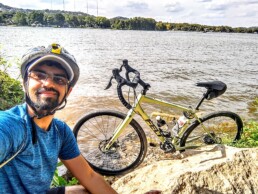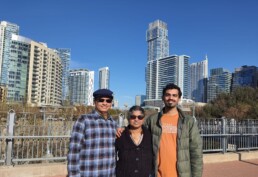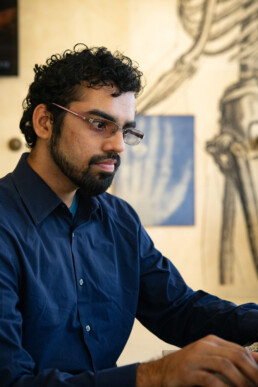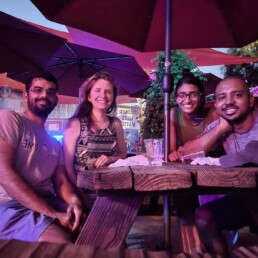by Ramces Luna
Ph.D. student Siva Saket Sripada persevered through the pandemic to find friendship and research collaboration on the Forty Acres
It’s been a whirlwind couple years for Siva Saket Sripada. He pulled off one of the biggest things someone can possibly do – moving across the world to pursue higher education. But just as he was getting started, he like many of us, had his life grind to a halt due to the COVID-19 pandemic.
After a stint at The University of Texas at Dallas and UT Southwestern Medical School, Sripada came to UT Austin to pursue his Ph.D. in biomedical engineering in 2020. Much of his first two years in the Cockrell School were spent in isolation, dealing with adjusting to a new life and new culture without the large communities of friends and colleagues that have always energized Sripada.
Today, Sripada is a member of Department of Biomedical Engineering Chair Tyrone Porter’s lab, where he is focused on medical ultrasound and photoacoustic image reconstruction. The goal is to simultaneously improve technological capabilities and accessibility for point-of-care diagnostics in rural and low-resource areas.
Sripada hails from Chennai, one of the oldest and most prominent port cities in southeast India and one of country’s largest hubs for education, music, art and dance. He earned his bachelor’s and master’s degrees in biological engineering in Chennai — from the Indian Institute of Technology, Madras before coming to the U.S. We sat down with Sripada to talk about his journey and his time at UT Austin.
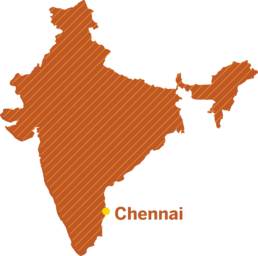
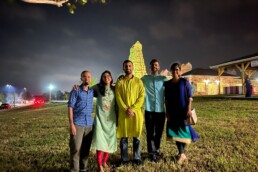
Sripada with friends and family at the Austin Hindu Temple and Community Center.
Q: Why did you decide to come to the U.S.?
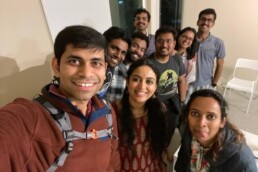
Sripada thrives within communities of friends and colleagues.
A: I got an opportunity to intern at the University of Minnesota’s College of Pharmacy and came to appreciate the graduate training process that U.S. universities offer — especially in exploring new research problems Additionally, I loved the idea of U.S. Ph.D. life — hard work, but also the flexibility to explore more interests in nature, biking and frisbee. And I really wanted be close to a river.
When I decided I wanted to pursue a Ph.D., the U.S. was an easy choice compared to the frigid Canadian/European (academic) weather — though I did apply to a couple schools outside the U.S. I chose Texas as my landing spot because I had family and friends here already, which made for an easier transition. I quickly made five close Indian friends in my biomedical engineering program at UT Dallas.
Q: What made you want to come to UT?
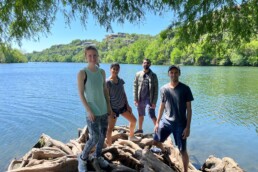
Sripada’s love of rivers and outdoor activities drew him to Austin and UT.
A: In addition to the idea of work-life balance in a riverside town, I also was keen on a university with a strong engineering program complemented by an adjacent medical center for holistic biomedical engineering graduate training. The Cockrell School’s location within walking/biking distance to Dell Seton Medical Center just seemed so perfect to me when I visited and got to see these neuro-engineering, faculty-led initiatives first hand. I was left feeling very inspired by the opportunities and possibilities. It goes without saying, but the stunning diversity in landscape/terrain of Austin’s rolling hills along the Colorado River was awe-inspiring in addition to the biking culture and infrastructure.
A: It was quite rough both at UT for me, and back in India for my family. Starting my Ph.D. program during this period of isolation was taxing. My long-distance buddies halfway across the globe gave me some relief. However, getting to know a whole new set of diverse colleagues, professionally, while dealing with our isolation and the emotions that created, in addition to deaths in our extended families back home in India, was debilitating. I didn’t fully realize the impact of these events until much later.
Over the past year, I got to experience such warmth and welcoming support and nurturing within the biomedical engineering program — thanks to professors Markey, Porter, Castillo, Santacruz and their lab members. I’ve felt appreciated by the undergraduates and staff too. My early, and arguably most important experiences at UT were restricted heavily to my department because of the pandemic. In the last year, I’ve gotten to experience a lot more of the Cockrell School and its programs focused on making international graduate students feel at home — both professionally and socially. In all, I feel good, albeit taking a little longer to catch up with the domestic grad students when it comes to some obvious social and professional things.
The ground floor of the Biomedical Engineering building is a favorite spot for Sripada.
Q: Did you experience any culture shock coming to the U.S. and later UT?
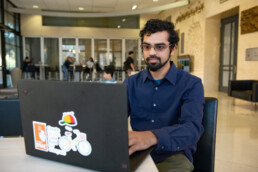
A: I didn’t feel much culture shock right away, with the soft landing in Dallas. But it eventually hit me like an uppercut out of nowhere in 2021. I had so much to unlearn and relearn when it came to the interpersonal aspect of professional life in my Ph.D. program and UT/Austin/Texas in general. The individualistic focus in U.S. culture was a challenge to cope with, especially during, and coming out of, the isolating pandemic.
Academically, I had very high goals for myself — as do most international graduate students coming into UT – and thus expectations for things to work out a certain way by a certain stage in my Ph.D. The uncertainties and challenges imposed in the aftermath of the pandemic left me feeling quite suffocated, dejected and even ashamed of myself professionally. These stepping stones
weren’t falling in place for me. It felt even worse when I foolishly looked at others in my cohort, and especially those who joined before and after my cohort, for whom everything seemed to be falling into place. Additionally, navigating the muddy waters of forging new collaborations was an uphill journey for me. For my Ph.D., I imagined experiencing science in the making — but never really got to witness the kind of scientific buzz in the corridors as I had glimpsed as an undergrad.
Fortunately, I had opportunities to build my own communities starting in 2022: both personal ones here in Austin and professional ones thanks to global conferences. I have had the fortune to help other UT students find a home away from home in Austin. Additionally, the Cockrell School’s support for grad student wellbeing gave me leverage to push faculty and students alike in BME to initiate a new program: the Work in Progress Student Seminars Series. This is a platform for exchanging science and feedback in a casual setting, whether that’s at BME or university housing on Lake Austin Boulevard.
As a teaching assistant and mid-stage Ph.D. student, I discovered the shockingly stressful and expensive undertaking that is higher education in the U.S. The number of things students here have to juggle in the process stretches them so thin. But I admire the resources and awareness for mental health provided at so many levels and across so many verticals/facets of life.
Q: How did you respond to these challenges?
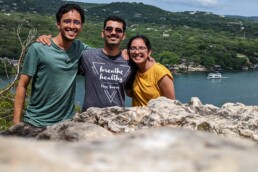
Sripada enjoys exploring the Austin area with friends old and new and bringing people together.
A: I am a very socially connected person, and I draw on the energy from people around me to overcome challenges in both my personal and professional lives. I am very grateful to the biomedical engineering community, which has helped me navigate these challenges in addition to my fellow international graduate student buddies. My heart goes out to them when I see so many domestic students struggle with challenges all by themselves, leading to burnout. I speak my mind freely on many topics in many languages, including computational ones, which helps me bond with people of diverse cultures, disciplines, ages/stages of life and interests. And I find joy in bring together folks who might not have crossed paths otherwise.
